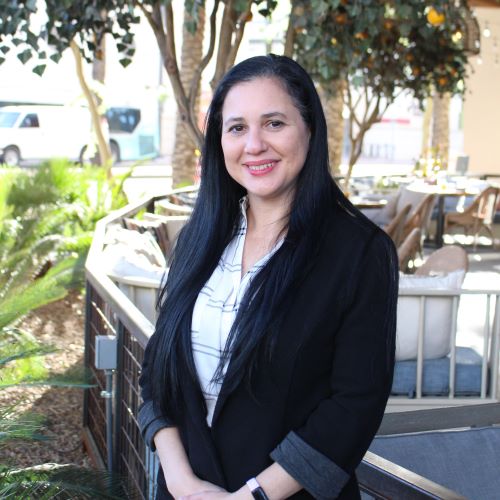When loved ones are diagnosed with Alzheimer’s disease and related dementias (ADRD), caregivers are often unprepared to effectively provide support. The challenges increase for many Hispanic families living in the U.S. for many reasons; one being support materials and resources aren’t available in their spoken language.
Enter Miriam Jocelyn Rodriguez, Ph.D., associate professor in the Department of Health & Wellness Design who was recently awarded a five-year K23 Mentored Patient-Oriented Research Career Development Award from the National Institute on Aging (NIA) in the amount of $900,535 for “Cultural adaptation of a mobile caregiver intervention for Hispanic dementia caregivers.” Dr. Rodriguez will work directly with her mentors—department chair Richard Holden, Ph.D. and Malaz Boustani, M.D. from IU School of Medicine—on adapting dementia care mobile telehealth app Brain CareNotes to the specific needs of Hispanic communities nationwide. Department colleague and co-mentor Nicole Werner, Ph.D. is assisting Dr. Rodriguez on the qualitative aims of her research, ensuring that Hispanic caregivers themselves can provide real-time, real-world input to help the app become responsive to specific needs.
“The intervention is currently only available in English, so first we need to provide it in Spanish,” says Dr. Rodriguez. “The language barrier is one of the major reasons why there is such a big underrepresentation of Hispanic people in ADRD research.”
The pilot study for Brain CareNotes, which has concluded, was tested with 60 participants over the course of six months. In the next phase, a larger sample group will test the app intervention for 12 months in a large scaled randomized controlled trial. Thanks to the diversity supplement grant Dr. Rodriguez received last year, of the 200 participants nationwide who will be part of this study —40 of them will be Hispanic and she will gather data on usability and acceptability and qualitative feedback. Because the K23 covers Dr. Rodriguez’s salary, research costs, and indirect costs through June 30, 2029, she will end her diversity supplement grant early to focus on extending her research to culturally adapt the intervention for caregivers.
“In the [Brain CareNotes] app, there’s some case studies to help orient the user into some of the challenging situations they may face,” shares Dr. Rodriguez. “Those vignettes need to be culturally translated to include Spanish names and culturally specific situations. For instance, if it is a case study involving food, include options like rice and beans. There is potential even in the advice cards for content that resonates with Hispanic culture, not just with cuisine but activities they may like to do, like dancing and family-oriented activities that incorporate the collectivist nature of Hispanic families.”
Dr. Rodriguez is also employing PROGRESS-Plus by Cochrane Methods Equity to guide her research. In this system, each symbol represents factors that play a role in either hindering or facilitating treatment—for example, place of residence.
“Hispanics tend to age in place,” says Dr. Rodriguez. “For White people/Caucasians, it is culturally appropriate when a loved one reaches the later stages of dementia diseases to admit them to an assisted living facility (ALF), but for Latinos, most insist that it is their dying wish that the loved one stays at home until the very end.”
Dr. Rodriguez says this cultural norm can pose a big challenge for caregivers who often have no formal training on how to handle end-stage situations—for instance, when the person becomes immobile but still needs to be bathed. This, coupled with the fact that many caregivers in Hispanic households work full-time and often don’t have access to insurance or high-quality healthcare, only makes the work that Dr. Rodriguez is conducting that much more vital.
In addition to the K23, Dr. Rodriguez is working on a grant proposal to also adapt the Healthy Aging Brain Care Monitor, included in the app, to be translated and validated for use amongst Spanish speaking populations.
“Having Malaz, the founder of that model, as a mentor is invaluable to my work,” says Dr. Rodriguez.
Dr. Rodriguez would also like to thank the study section at NIA who gave her K23 grant submission a rarely received overall perfect score of 10.
“It means that everyone in the study section was so excited about my work that they gave me a 1 [being the best] on my application,” says Dr. Rodriguez. “I have seen first-hand the struggle even in my own family on handling an ADRD diagnosis, and it has really motivated me to find solutions for Hispanics because it is really a struggle for this population.”
For more stories about SPH-B students and faculty making a big difference both locally and worldwide, visit go.iu.edu/48bx.


